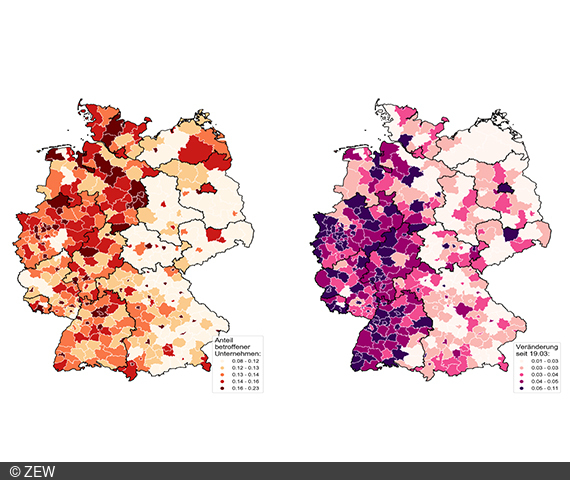Increasing Number of Companies Affected by Coronavirus Pandemic
ResearchWeb Data Analysis on Effects of the Coronavirus Pandemic
The effects of the current coronavirus crisis are also evident on the websites of companies based in Germany. Within the last four weeks, the share of companies mentioning the pandemic on their websites has increased by almost 40 per cent to more than 150,000 companies (14.2 per cent). Both the percentage of affected companies and the reasons for mentioning the pandemic vary according to sector and geographical location. These are the findings of a unique online evaluation of company websites by ZEW Mannheim and the Justus Liebig University (JLU) Giessen in cooperation with the start-up company istari.ai.
Twice a week, the researchers collect up-to-date data to determine the effects of the coronavirus pandemic on companies in Germany. For this purpose, an automated process developed by istari.ai is used to search company websites for information on the coronavirus pandemic. The study is based on 1.36 million web addresses of companies from the Mannheim Enterprise Panel. Between 19 March and 15 April 2020, the share of companies referring to the coronavirus rose by 40 per cent to more than 14 per cent. There are, however, some significant differences between individual sectors.
“The coronavirus pandemic is more often mentioned on websites of public administration authorities, entertainment companies and educational and training institutions. By contrast, such references are much less frequent in the construction industry and wholesale trade, for example. The dynamics also vary considerably. In the past four weeks, particularly pronounced dynamics could be witnessed in the healthcare sector,” says Jan Kinne, researcher in the ZEW Research Department “Economics of Innovation and Industrial Dynamics”, co-founder of istari.ai and co-author of the expert brief.
West-East divide in nationwide comparison
A nationwide comparison reveals a west-east divide: Especially in the East German federal states there are fewer companies that address the coronavirus pandemic on their websites. The increase in the number of companies referring to COVID-19 on their webpages has also been much more dynamic in the western and southwestern regions of Germany.
In addition to looking to mere references to the coronavirus pandemic, the researchers are also investigating the context in which these references appear on company websites. “With our AI web analysis model developed at istari.ai we can categorize the affected companies into different groups, depending on the context in which the pandemic is mentioned. In this way, for example, companies that report closures can be distinguished from those that perhaps only announce changed opening hours,” says Jan Kinne. “Again, clear differences between individual regions and sectors have become apparent in this regard. According to our findings, companies from the entertainment and culture industries, for example, are particularly struggling with the current situation. On the other hand, there are a great many companies in northeastern Germany who report that they are not facing any major problems,” says Kinne.
What is special about this analysis is that results are updated almost on a daily basis. “The method used by istari.ai, which is based on web data and artificial intelligence, provides significant results for a high number of companies in a very short time, making even detailed regional and sector-related analyses possible,” explains Professor Peter Winker, professor at JLU and co-author of the study, “a comparable instrument has not been used so far.”
